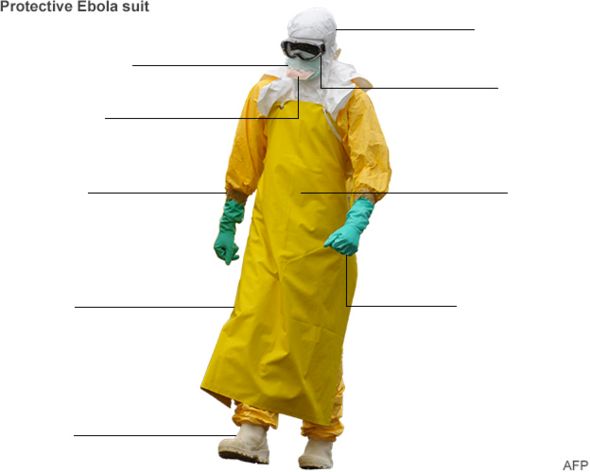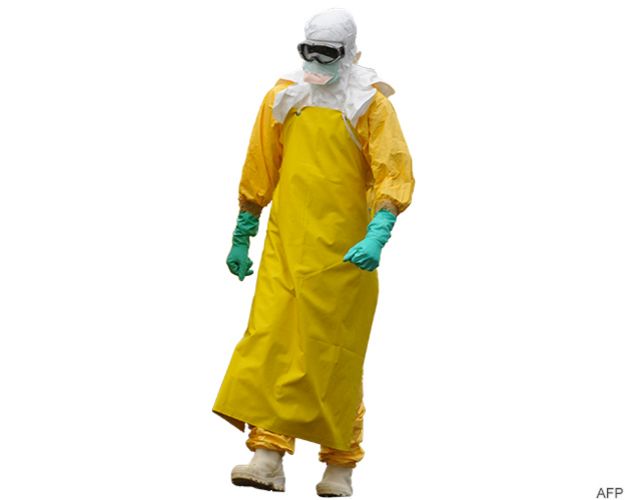Ebola challenge 'biggest since Aids'
Ebola outbreak
The Ebola outbreak in West Africa is unlike anything since the emergence of HIV/Aids, top US medical official Thomas Frieden has said.
A fast global response could ensure that it did not become "the next Aids," the director of the Centers for Disease Control and Prevention (CDC) said.
Dr Frieden was addressing a high-level World Bank forum about the crisis.
The outbreak has killed more than 3,860 people, mainly in West Africa, including more than 200 health workers.
On Thursday, a Liberian doctor died of the disease at a treatment centre in Monrovia, health officials said.
Ugandan-born John Taban Dada had been working at the country's largest hospital, the John F Kennedy Memorial Center, his former colleagues said.
His death brings to four the number of doctors who have died in Liberia since the outbreak.
Meanwhile, the health of a Spanish nurse who became the first person to contract Ebola outside of West Africa has worsened, a hospital official said on Thursday.
Teresa Romero is now being helped with her breathing in hospital, according to her brother. Two doctors who treated her have also been admitted for observation.
 Scientists are racing to understand - and combat - the Ebola virus
Scientists are racing to understand - and combat - the Ebola virus How not to catch Ebola
- Avoid direct contact with sick patients
- Wear goggles to protect eyes
- Clothing and clinical waste should be incinerated and any medical equipment that needs to be kept should be decontaminated
- People who recover from Ebola should abstain from sex or use condoms for three months
The EU has announced plans for a system to evacuate international staff from Ebola-infected countries if they show signs of the disease.
The evacuation system will allow patients to be flown within 48 hours to European hospitals "that are equipped to deal with the disease," a statement from the European commission said.
The move is expected to make it easier to deploy European medical workers to combat the crisis in West Africa.
Separately, Nigeria's government says 200 healthcare workers have volunteered to be deployed to Liberia, Sierra Leone and Guinea as part of a global response team on Ebola.
Nigeria, which has had seven confirmed deaths from the virus, seems to have successfully contained the spread of the haemorrhagic fever, the BBC's Chris Ewokor in Abuja says.
At the meeting in Washington, the deputy head of the World Health Organisation, Bruce Alyward, said Ebola was "entrenched in capitals" of the worst-affected countries and was "accelerating in all settings".
He said heads of state faced an extraordinary challenge as they sought to communicate urgency but not cause panic.
Mr Frieden described Ebola as one of the biggest crises he had seen in his career.
"I would say that in the 30 years I've been working in public health, the only thing like this has been Aids," he said.
In other developments,
- The US is introducing new security measures to screen passengers arriving from Ebola-affected countries in West Africa at five major US airports
- In Texas, a county sheriff deputy was quarantined after visiting the home of the first person diagnosed with Ebola on US soil, who later died from the virus.
- An Australian nurse recently returned from working with the Red Cross in Sierra Leone is undergoing testing in a hospital in Queensland. She is reported to have had an increased temperature but was "feeling well", the Red Cross said.
Ebola facts |
|---|
| Source: NHS and World Health Organization |
| People can catch Ebola if they are in direct contact with the bodily fluids of an infected person or animal |
| Early symptoms include fever, muscle pain, headache and sore throat. This is followed by vomiting, diarrhoea and bleeding, sometimes from the eyes and mouth |
| The current outbreak started in March in west Africa, where the worst-affected countries include Guinea, Sierra Leone and Liberia |
| It is thought unlikely that the disease would spread if it did come to the UK because quarantine and communications are more developed than in parts of western Africa |
| There is no licensed Ebola vaccine but treatments are in development |

Surgical cap
Goggles
Medical mask
Scrubs
Overalls
Apron
Double gloves

-
Goggles
×Goggles, or eye visors, are used to provide cover to the eyes, protecting them from splashes. The goggles are sprayed with an anti-fogging solution before being worn.
-
Medical mas
Covers the mouth to protect from sprays of blood or body fluids from patients. When wearing a respirator, the medical worker must tear this outer mask to allow the respirator through.
-
Respirator
×A respirator is worn to protect the wearer from a patient's coughs. According to guidelines from the medical charity Medecins Sans Frontieres (MSF), the respirator should be put on second, right after donning the overalls.
-
Medical Scrubs
×A surgical scrub suit, durable hospital clothing that absorbs liquid and is easily cleaned, is worn as a baselayer underneath the overalls. It is normally tucked into rubber boots to ensure no skin is exposed.
-
Overalls
×The overalls are placed on top of the scrubs. These suits are similar to hazardous material (hazmat) suits worn in toxic environments. The team member supervising the process should check that the equipment is not damaged.
-
Double gloves
×A minimum two sets of gloves are required, placed over the suit sleeves. Medical workers must change gloves between patients, performing thorough hand hygiene before donning a new pair. Heavy duty gloves are used whenever workers need to handle infectious waste.
-
Apron
×A waterproof apron is placed on top of the overalls as a final layer of protective clothing.
-
Boots
×Ebola health workers typically wear rubber boots, with the scrubs tucked into the footwear. If boots are unavailable, workers must wear closed, puncture and fluid-resistant shoes.
-
Su
Video
-
 How Ebola attacks Watch
How Ebola attacks Watch The Ebola outbreak in West Africa is the deadliest occurrence of the disease since its discovery in 1976. This graphic explains how it attacks human cells.
































No comments:
ehijoshua2 at facebook